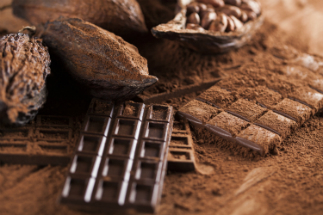We ask you, urgently: don't scroll past this
Dear readers, Catholic Online was de-platformed by Shopify for our pro-life beliefs. They shut down our Catholic Online, Catholic Online School, Prayer Candles, and Catholic Online Learning Resources essential faith tools serving over 1.4 million students and millions of families worldwide. Our founders, now in their 70's, just gave their entire life savings to protect this mission. But fewer than 2% of readers donate. If everyone gave just $5, the cost of a coffee, we could rebuild stronger and keep Catholic education free for all. Stand with us in faith. Thank you.Help Now >
No, you're not going to lose your chocolate to global warming
FREE Catholic Classes
You can ignore melting Arctic ice, and you can ignore starving polar bears, but you may find it harder to ignore the hole in your heart that chocolate once filled. That's the idea at least behind the latest viral prediction that suggests global warming will cause your chocolate to disappear by 2050.

Now they're coming for our chocolate!
Highlights
Catholic Online (https://www.catholic.org)
1/2/2018 (8 years ago)
Published in Green
Keywords: Cacao, chocolate, global warming
LOS ANGELES, CA (California Network) - Chocolate, as in real chocolate that comes from the cacao plant, can only be grown under specific conditions. Most of the world's chocolate is grown within 10 degrees of the equator, and all of it is grown within 20 degrees. Outside of this belt, the crop simply can't grow. The soil conditions have to be right, and humidity levels must be high.
When the right factors are present, viola! We get cacao beans which can be powdered and turned into chocolate. It should be noted here, most people do not eat actual chocolate. Much of the chocolate sold to consumers is "chocolate flavored" candy made with a variety of substitutes and flavorings. Actual chocolate is bitter and very expensive, but its flavor and texture are remarkable, and when blended into the right confection, it becomes an unforgettable treat that you can't help but savor by nibbling.
However, the climate experts warn this treat is under threat. Not only is the crop difficult to produce, with most farmers barely making ends meet, but now hotter weather with lower humidity is hurting the crops, diminishing their quality.According to projections from NOAA, the rise in global temperatures is forecast to decrease humidity in regions such as the Ivory Coast and Ghana, where half to seventy percent of the world's cacao crop is raised. This will force growers to cultivate land at higher altitudes where competition for land is already fierce. Eventually, by around 2050, the conditions for cacao growing will be so diminished, that the crop will begin going extinct.
The threat is real enough that Mars company, which makes your favorite Snickers or Twix bars, among others, is funding research into modifying the cacao plant. Their hope is that the gene editing technology CRISPR can create hardier strains of cacao plant that will grow in the changing conditions. Researchers at UC Berkely are leading the effort.
If you're skeptical about the world running out of chocolate by 2050, you're in good company. Despite the strident warnings, it is unlikely chocolate will go extinct in that time.
The forecast for the extinction of the crop does not say it will go entirely extinct. The forecast suggests, however, that growing conditions, particularly in West Africa, will decline. We are seeing some evidence of this already. But so far, the greatest threat to production remains soil quality and poor cultivation practices.
The next four decades will also see the introduction of genetically modified strains of cacao, as well as the widespread introduction of vertical farming, which allows crops to be grown under factory conditions almost anywhere in the world. These advancements suggest the world will see more cacao production in the years ahead, not less.
In the short term, prices could rise but a rise in prices will also spur development of solutions to counteract any future shortage, which is how the free market works to solve natural challenges.
While we should be concerned about climate change and especially human-induced global warming, we should also have faith in our ability to adapt and overcome some of the challenges presented by it. There are legitimate worries when it comes to climate change, such as sea level rise, and the increased frequency of extreme weather events around the world. However, the disappearance of chocolate probably isn't one of them.
Support FREE Catholic Education
---
'Help Give every Student and Teacher FREE resources for a world-class Moral Catholic Education'
Copyright 2021 - Distributed by Catholic Online
Join the Movement
When you sign up below, you don't just join an email list - you're joining an entire movement for Free world class Catholic education.
- Easter / Lent
- 5 Lenten Prayers
- Ash Wednesday
- 7 Morning Prayers
- Mysteries of the Rosary
- Litany of the Bl. Virgin Mary
- Popular Saints
- Popular Prayers
- Female Saints
- Saint Feast Days by Month
- Stations of the Cross
- St. Francis of Assisi
- St. Michael the Archangel
- The Apostles' Creed
- Unfailing Prayer to St. Anthony
- Pray the Rosary
![]()
Copyright 2026 Catholic Online. All materials contained on this site, whether written, audible or visual are the exclusive property of Catholic Online and are protected under U.S. and International copyright laws, © Copyright 2026 Catholic Online. Any unauthorized use, without prior written consent of Catholic Online is strictly forbidden and prohibited.
Catholic Online is a Project of Your Catholic Voice Foundation, a Not-for-Profit Corporation. Your Catholic Voice Foundation has been granted a recognition of tax exemption under Section 501(c)(3) of the Internal Revenue Code. Federal Tax Identification Number: 81-0596847. Your gift is tax-deductible as allowed by law.









